26 start with O start with O
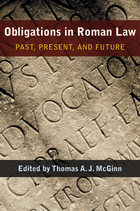
Long a major element of classical studies, the examination of the laws of the ancient Romans has gained momentum in recent years as interdisciplinary work in legal studies has spread. Two resulting issues have arisen, on one hand concerning Roman laws as intellectual achievements and historical artifacts, and on the other about how we should consequently conceptualize Roman law.
Drawn from a conference convened by the volume's editor at the American Academy in Rome addressing these concerns and others, this volume investigates in detail the Roman law of obligations—a subset of private law—together with its subordinate fields, contracts and delicts (torts). A centuries-old and highly influential discipline, Roman law has traditionally been studied in the context of law schools, rather than humanities faculties. This book opens a window on that world.
Roman law, despite intense interest in the United States and elsewhere in the English-speaking world, remains largely a continental European enterprise in terms of scholarly publications and access to such publications. This volume offers a collection of specialist essays by leading scholars Nikolaus Benke, Cosimo Cascione, Maria Floriana Cursi, Paul du Plessis, Roberto Fiori, Dennis Kehoe, Carla Masi Doria, Ernest Metzger, Federico Procchi, J. Michael Rainer, Salvo Randazzo, and Bernard Stolte, many of whom have not published before in English, as well as opening and concluding chapters by editor Thomas A. J. McGinn.
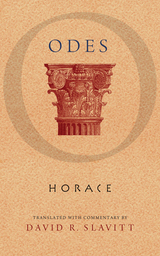
This edition is also notable for Slavitt’s extensive notes and commentary about the art of translation. He presents the problems he encountered in making the translation, discussing possible solutions and the choices he made among them. The effect of the notes is to bring the reader even closer to the original Latin and to understand better how to gauge the distance between the two languages.
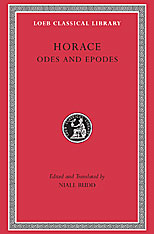
Monumental verse.
The poetry of Horace (born 65 BC) is richly varied, its focus moving between public and private concerns, urban and rural settings, Stoic and Epicurean thought. The Loeb Classical Library edition of the great Roman poet’s Odes and Epodes boasts a faithful and fluid translation and reflects current scholarship.
Horace took pride in being the first Roman to write a body of lyric poetry. For models he turned to Greek lyric, especially to the poetry of Alcaeus, Sappho, and Pindar; but his poems are set in a Roman context. His four books of Odes cover a wide range of moods and topics. Some are public poems, upholding the traditional values of courage, loyalty, and piety; and there are hymns to the gods. But most of the Odes are on private themes: chiding or advising friends; speaking about love and amorous situations, often amusingly. Horace’s seventeen Epodes, which he called iambi, were also an innovation for Roman literature. Like the Odes they were inspired by a Greek model: the seventh-century iambic poetry of Archilochus. Love and political concerns are frequent themes; the tone is only occasionally aggressive. “In his language he is triumphantly adventurous,” Quintilian said of Horace; Niall Rudd’s translation reflects his different voices.
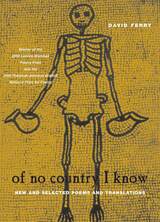
"Though Ferry is perhaps best known for his eloquent translations of Horace and Virgil, "Of No Country I Know" demonstrates that he deserves acclaim for his own poetry as well."—Carmela Ciuraru, New York Times Book Review
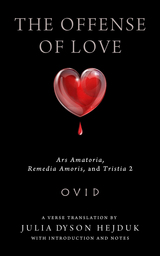
In exile, Ovid composed Sad Things (Tristia), which included a defense of his life and work as brilliant and cheeky as his controversial love manuals. In a poem addressed to Augustus (Tristia 2), he argues, "Since all of life and literature is one long, steamy sex story, why single poor Ovid out?" While seemingly groveling at the emperor's feet, he creates an image of Augustus as capricious tyrant and himself as suffering artist that wins over every reader (except the one to whom it was addressed).
Bringing together translations of the Ars Amatoria, Remedia Amoris, and Tristia 2, Julia Dyson Hejduk's The Offense of Love is the first book to include both the offense and the defense of Ovid's amatory work in a single volume. Hejduk's elegant and accurate translations, helpful notes, and comprehensive introduction will guide readers through Ovid's wickedly witty poetic tour of the literature, mythology, topography, religion, politics, and (of course) sexuality of ancient Rome.
Finalist, National Translation Award, American Literary Translators Association
A Choice Outstanding Academic Book

Cultivated farming advice.
Cato (M. Porcius Cato) the elder (234–149 BC) of Tusculum, statesman and soldier, was the first important writer in Latin prose. His speeches, works on jurisprudence and the art of war, his precepts to his son on various subjects, and his great historical work on Rome and Italy are lost. But we have his De Agricultura; terse, severely wise, grimly humorous, it gives rules in various aspects of a farmer’s economy, including even medical and cooking recipes, and reveals interesting details of domestic life.
Varro (M. Terentius) of Reate (116–27 BC), renowned for his vast learning, was an antiquarian, historian, philologist, student of science, agriculturist, and poet. He was a republican who was reconciled to Julius Caesar and was marked out by him to supervise an intended national library. Of Varro’s more than seventy works involving hundreds of volumes we have only one on agriculture and country affairs (Rerum Rusticarum) and part of his work on the Latin language (De Lingua Latina; LCL 333, 334), though we know much about his Satires. Each of the three books on country affairs begins with an effective mise en scene and uses dialogue. The first book deals with agriculture and farm management, the second with sheep and oxen, the third with poultry and the keeping of other animals large and small, including bees and fish ponds. There are lively interludes and a graphic background of political events.

A Roman farmer on farming.
Columella (Lucius Iunius Moderatus) of Gades (Cadiz) lived in the reigns of the first emperors to about AD 70. He moved early in life to Italy where he owned farms and lived near Rome. It is probable that he did military service in Syria and Cilicia and that he died at Tarentum.
Columella’s On Agriculture (De re rustica) is the most comprehensive, systematic, and detailed of Roman agricultural works. Book 1 covers choice of farming site; water supply; buildings; staff. 2: Plowing; fertilizing; care of crops. 3–5: Cultivation, grafting, and pruning of fruit trees, vines, and olives. 6: Acquisition, breeding, and rearing of oxen, horses, and mules; veterinary medicine. 7: Sheep, goats, pigs, and dogs. 8: Poultry; fish ponds. 9: Bee-keeping. 10 (in hexameter poetry): Gardening. 11: Duties of the overseer of a farm; calendar for farm work; more on gardening. 12: Duties of the overseer’s wife; manufacture of wines; pickling; preserving. There is also a separate treatise, Trees (De arboribus), on vines and olives and various trees, perhaps part of an otherwise lost work written before On Agriculture.
The Loeb Classical Library edition of Columella is in three volumes.

A Roman farmer on farming.
Columella (Lucius Iunius Moderatus) of Gades (Cadiz) lived in the reigns of the first emperors to about AD 70. He moved early in life to Italy where he owned farms and lived near Rome. It is probable that he did military service in Syria and Cilicia and that he died at Tarentum.
Columella’s On Agriculture (De re rustica) is the most comprehensive, systematic, and detailed of Roman agricultural works. Book 1 covers choice of farming site; water supply; buildings; staff. 2: Plowing; fertilizing; care of crops. 3–5: Cultivation, grafting, and pruning of fruit trees, vines, and olives. 6: Acquisition, breeding, and rearing of oxen, horses, and mules; veterinary medicine. 7: Sheep, goats, pigs, and dogs. 8: Poultry; fish ponds. 9: Bee-keeping. 10 (in hexameter poetry): Gardening. 11: Duties of the overseer of a farm; calendar for farm work; more on gardening. 12: Duties of the overseer’s wife; manufacture of wines; pickling; preserving. There is also a separate treatise, Trees (De arboribus), on vines and olives and various trees, perhaps part of an otherwise lost work written before On Agriculture.
The Loeb Classical Library edition of Columella is in three volumes.

A Roman farmer on farming.
Columella (Lucius Iunius Moderatus) of Gades (Cadiz) lived in the reigns of the first emperors to about AD 70. He moved early in life to Italy where he owned farms and lived near Rome. It is probable that he did military service in Syria and Cilicia and that he died at Tarentum.
Columella’s On Agriculture (De re rustica) is the most comprehensive, systematic, and detailed of Roman agricultural works. Book 1 covers choice of farming site; water supply; buildings; staff. 2: Plowing; fertilizing; care of crops. 3–5: Cultivation, grafting, and pruning of fruit trees, vines, and olives. 6: Acquisition, breeding, and rearing of oxen, horses, and mules; veterinary medicine. 7: Sheep, goats, pigs, and dogs. 8: Poultry; fish ponds. 9: Bee-keeping. 10 (in hexameter poetry): Gardening. 11: Duties of the overseer of a farm; calendar for farm work; more on gardening. 12: Duties of the overseer’s wife; manufacture of wines; pickling; preserving. There is also a separate treatise, Trees (De arboribus), on vines and olives and various trees, perhaps part of an otherwise lost work written before On Agriculture.
The Loeb Classical Library edition of Columella is in three volumes.
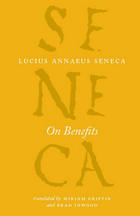
Lucius Annaeus Seneca (4 BCE–65 CE) was a Roman Stoic philosopher, dramatist, statesman, and advisor to the emperor Nero, all during the Silver Age of Latin literature. The Complete Works of Lucius Annaeus Seneca is a fresh and compelling series of new English-language translations of his works in eight accessible volumes. Edited by world-renowned classicists Elizabeth Asmis, Shadi Bartsch, and Martha C. Nussbaum, this engaging collection restores Seneca—whose works have been highly praised by modern authors from Desiderius Erasmus to Ralph Waldo Emerson—to his rightful place among the classical writers most widely studied in the humanities.
On Benefits, written between 56 and 64 CE, is a treatise addressed to Seneca’s close friend Aebutius Liberalis. The longest of Seneca’s works dealing with a single subject—how to give and receive benefits and how to express gratitude appropriately—On Benefits is the only complete work on what we now call “gift exchange” to survive from antiquity. Benefits were of great personal significance to Seneca, who remarked in one of his later letters that philosophy teaches, above all else, to owe and repay benefits well.

Roman biographies of foreign commanders.
Cornelius Nepos was born in Cisalpine Gaul but lived in Rome and was a friend of Cicero, Atticus, and Catullus. Most of his writings, which included poems, moral examples from history, a chronological sketch of general history, a geographical work, Lives of Cato the Elder and Cicero, and other biographies, are lost. Extant is a portion of his De viris illustribus: (i) part of his parallel Lives of Roman and non-Roman famous men, namely the portion containing Lives of non-Roman generals (all Greeks except three) and a chapter on kings; and (ii) two Lives from the class of historians. The Lives are short popular biographies of various kinds, written in a usually plain readable style, of value today because of Nepos’ use of many good sources.

A Roman layman’s account of medicine in his time.
A. Cornelius Celsus was author, probably during the reign of the Roman Emperor Tiberius (AD 14–37), of a general encyclopedia of agriculture, medicine, military arts, rhetoric, philosophy, and jurisprudence, in that order of subjects. Of all this great work there survives only the eight books on medicine (De Medicina).
In Book I, after an excellent survey of Greek schools (Dogmatic, Methodic, Empiric) of medicine come sensible dietetics that will always be applicable. Book II deals with prognosis, diagnosis of symptoms (which he stresses strongly), and general therapeutics. Book III addresses internal ailments, fevers, and general diseases. Book IV treats local bodily diseases. Next come two pharmacological books, Book V on treatment by drugs of general diseases, and Book VI on local diseases. Books VII and VIII deal with surgery; these books contain accounts of many operations, including amputation.
Celsus was not a professional doctor of medicine or a surgeon, but a practical layman whose On Medicine, written in a clear and neat style for lay readers, is partly a result of his medical treatment of his household (slaves included), and partly a presentation of information gained from many Greek authorities. From no other source can we learn so much of the condition of medical science up to his own time.
The Loeb Classical Library edition of Celsus is in three volumes.

A Roman layman’s account of medicine in his time.
A. Cornelius Celsus was author, probably during the reign of the Roman Emperor Tiberius (AD 14–37), of a general encyclopedia of agriculture, medicine, military arts, rhetoric, philosophy, and jurisprudence, in that order of subjects. Of all this great work there survives only the eight books on medicine (De Medicina).
In Book I, after an excellent survey of Greek schools (Dogmatic, Methodic, Empiric) of medicine come sensible dietetics that will always be applicable. Book II deals with prognosis, diagnosis of symptoms (which he stresses strongly), and general therapeutics. Book III addresses internal ailments, fevers, and general diseases. Book IV treats local bodily diseases. Next come two pharmacological books, Book V on treatment by drugs of general diseases, and Book VI on local diseases. Books VII and VIII deal with surgery; these books contain accounts of many operations, including amputation.
Celsus was not a professional doctor of medicine or a surgeon, but a practical layman whose On Medicine, written in a clear and neat style for lay readers, is partly a result of his medical treatment of his household (slaves included), and partly a presentation of information gained from many Greek authorities. From no other source can we learn so much of the condition of medical science up to his own time.
The Loeb Classical Library edition of Celsus is in three volumes.

A Roman layman’s account of medicine in his time.
A. Cornelius Celsus was author, probably during the reign of the Roman Emperor Tiberius (AD 14–37), of a general encyclopedia of agriculture, medicine, military arts, rhetoric, philosophy, and jurisprudence, in that order of subjects. Of all this great work there survives only the eight books on medicine (De Medicina).
In Book I, after an excellent survey of Greek schools (Dogmatic, Methodic, Empiric) of medicine come sensible dietetics that will always be applicable. Book II deals with prognosis, diagnosis of symptoms (which he stresses strongly), and general therapeutics. Book III addresses internal ailments, fevers, and general diseases. Book IV treats local bodily diseases. Next come two pharmacological books, Book V on treatment by drugs of general diseases, and Book VI on local diseases. Books VII and VIII deal with surgery; these books contain accounts of many operations, including amputation.
Celsus was not a professional doctor of medicine or a surgeon, but a practical layman whose On Medicine, written in a clear and neat style for lay readers, is partly a result of his medical treatment of his household (slaves included), and partly a presentation of information gained from many Greek authorities. From no other source can we learn so much of the condition of medical science up to his own time.
The Loeb Classical Library edition of Celsus is in three volumes.

Three late dialogues.
Cicero (Marcus Tullius, 106–43 BC), Roman lawyer, orator, politician and philosopher, of whom we know more than of any other Roman, lived through the stirring era that saw the rise, dictatorship, and death of Julius Caesar in a tottering republic. In his political speeches especially and in his correspondence we see the excitement, tension and intrigue of politics and the part he played in the turmoil of the time. Of about 106 speeches, delivered before the Roman people or the Senate if they were political, before jurors if judicial, fifty-eight survive (a few of them incompletely). In the fourteenth century Petrarch and other Italian humanists discovered manuscripts containing more than 900 letters of which more than 800 were written by Cicero and nearly 100 by others to him. These afford a revelation of the man all the more striking because most were not written for publication. Six rhetorical works survive and another in fragments. Philosophical works include seven extant major compositions and a number of others; and some lost. There is also poetry, some original, some as translations from the Greek.
The Loeb Classical Library edition of Cicero is in twenty-nine volumes.

Ancient Roman word lore.
Varro (M. Terentius), 116–27 BC, of Reate, renowned for his vast learning, was an antiquarian, historian, philologist, student of science, agriculturist, and poet. He was a republican who was reconciled to Julius Caesar and was marked out by him to supervise an intended national library.
Of Varro’s more than seventy works involving hundreds of volumes we have only his treatise On Agriculture (in LCL 283) and part of his monumental achievement De Lingua Latina (On the Latin Language), a work typical of its author’s interest not only in antiquarian matters but also in the collection of scientific facts. Originally it consisted of twenty-five books in three parts: etymology of Latin words (Books 1–7); their inflections and other changes (Books 8–13); and syntax (Books 14–25). Of the whole work survive (somewhat imperfectly) Books 5–10. These are from the section (Books 4–6) that applied etymology to words of time and place and to poetic expressions; the section (Books 7–9) on analogy as it occurs in word formation; and the section (Books 10–12) that applied analogy to word derivation. Varro’s work contains much that is of very great value to the study of the Latin language.
The Loeb Classical Library edition of On the Latin Language is in two volumes.

Ancient Roman word lore.
Varro (M. Terentius), 116–27 BC, of Reate, renowned for his vast learning, was an antiquarian, historian, philologist, student of science, agriculturist, and poet. He was a republican who was reconciled to Julius Caesar and was marked out by him to supervise an intended national library.
Of Varro’s more than seventy works involving hundreds of volumes we have only his treatise On Agriculture (in LCL 283) and part of his monumental achievement De Lingua Latina (On the Latin Language), a work typical of its author’s interest not only in antiquarian matters but also in the collection of scientific facts. Originally it consisted of twenty-five books in three parts: etymology of Latin words (Books 1–7); their inflections and other changes (Books 8–13); and syntax (Books 14–25). Of the whole work survive (somewhat imperfectly) Books 5–10. These are from the section (Books 4–6) that applied etymology to words of time and place and to poetic expressions; the section (Books 7–9) on analogy as it occurs in word formation; and the section (Books 10–12) that applied analogy to word derivation. Varro’s work contains much that is of very great value to the study of the Latin language.
The Loeb Classical Library edition of On the Latin Language is in two volumes.

The philosopher-statesman on theology and epistemology.
Cicero (Marcus Tullius, 106–43 BC), Roman lawyer, orator, politician, and philosopher, of whom we know more than of any other Roman, lived through the stirring era that saw the rise, dictatorship, and death of Julius Caesar in a tottering republic. In his political speeches especially and in his correspondence we see the excitement, tension, and intrigue of politics and the part he played in the turmoil of the time. Of about 106 speeches, delivered before the Roman people or the Senate if they were political, before jurors if judicial, fifty-eight survive (a few of them incompletely). In the fourteenth century Petrarch and other Italian humanists discovered manuscripts containing more than 900 letters of which more than 800 were written by Cicero and nearly 100 by others to him. These afford a revelation of the man all the more striking because most were not written for publication. Six rhetorical works survive and another in fragments. Philosophical works include seven extant major compositions and a number of others; and some lost. There is also poetry, some original, some as translations from the Greek.
The Loeb Classical Library edition of Cicero is in twenty-nine volumes.

The statesman on statecraft.
Cicero (Marcus Tullius, 106–43 BC), Roman lawyer, orator, politician, and philosopher, of whom we know more than of any other Roman, lived through the stirring era that saw the rise, dictatorship, and death of Julius Caesar in a tottering republic. In his political speeches especially and in his correspondence we see the excitement, tension, and intrigue of politics and the part he played in the turmoil of the time. Of about 106 speeches, delivered before the Roman people or the Senate if they were political, before jurors if judicial, fifty-eight survive (a few of them incompletely). In the fourteenth century Petrarch and other Italian humanists discovered manuscripts containing more than 900 letters of which more than 800 were written by Cicero and nearly 100 by others to him. These afford a revelation of the man all the more striking because most were not written for publication. Six rhetorical works survive and another in fragments. Philosophical works include seven extant major compositions and a number of others; and some lost. There is also poetry, some original, some as translations from the Greek.
The Loeb Classical Library edition of Cicero is in twenty-nine volumes.

Ancient Rome’s original archconservative.
M. Porcius Cato (234–149 BC), one of the best-known figures of the middle Roman Republic, remains legendary for his political and military career, especially his staunch opposition to Carthage; his modest way of life; his integrity of character and austere morality; his literary works, composed in a style at once sophisticated and down-to-earth; his pithy sayings; and his drive to define and to champion Roman national character and traditions in the face of challenges from Greek culture. Cato’s legend derived to no small degree from his own distinctive and compelling self-presentation, which established a model later developed and elaborated by Cicero and by subsequent literary and historical authors for centuries to come.
This volume and its companion (LCL 551) join the Loeb edition of Cato’s only extant work, On Agriculture (LCL 283), by supplying all testimonia about, and all fragments by or attributed to Cato. Highlights are Origines, the first historical work attested in Latin, a history of Rome from its founding to the onset of the first Punic War, as well as the origins of major Italian cities; his orations, regarded as the beginning of Roman oratory; To His Son Marcus, which inaugurated a Roman tradition of didactic pieces addressed by fathers to their sons; Military Matters; the Poem on Morals; letters; commentaries on civil law; and memorable sayings.
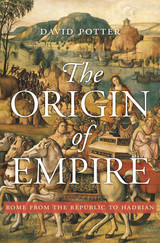
Beginning with the Roman army’s first foray beyond its borders and concluding with the death of Hadrian in 138 CE, this panoramic history of the early Roman Empire recounts the wars, leaders, and social transformations that lay the foundations of imperial success.
Between 264 BCE, when the Roman army crossed into Sicily, and the death of Hadrian nearly three hundred years later, Rome became one of the most successful multicultural empires in history. In this vivid guide to a fascinating period, David Potter explores the transformations that occurred along the way, as Rome went from republic to mercenary state to bureaucratic empire, from that initial step across the Straits of Messina to the peak of territorial expansion.
Rome was shaped by endless political and diplomatic jockeying. As other Italian city-states relinquished sovereignty in exchange for an ironclad guarantee of protection, Rome did not simply dominate its potential rivals—it absorbed them by selectively offering citizenship and constructing a tiered membership scheme that allowed Roman citizens to maintain political control without excluding noncitizens from the state’s success. Potter attributes the empire’s ethnic harmony to its relative openness.
This imperial policy adapted and persisted over centuries of internal discord. The fall of the republican aristocracy led to the growth of mercenary armies and to the creation of a privatized and militarized state that reached full expression under Julius Caesar. Subsequently, Augustus built a mighty bureaucracy, which went on to manage an empire ruled by a series of inattentive, intemperate, and bullying chief executives. As contemporary parallels become hard to ignore, The Origin of Empire makes clear that the Romans still have much to teach us about power, governance, and leadership.
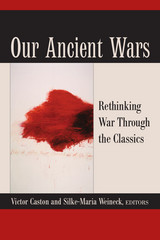
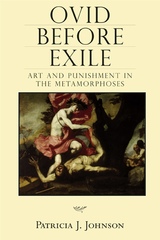
Patricia J. Johnson demonstrates how the production of art—specifically poetry—changed dramatically during the reign of Augustus. By Ovid’s final decade in Rome, the atmosphere for artistic work had transformed, leading to a drop in poetic production of quality. Johnson shows how Ovid, in the episodes of artistic creation that anchor his Metamorphoses, responded to his audience and commented on artistic circumstances in Rome.
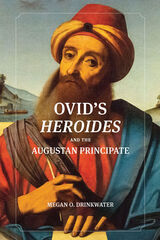
It was in this era of turmoil and transformation that Ovid, the Roman poet best known for Metamorphoses, was born. The Heroides, one of his earliest and most elusive works, is not written from the first-person perspective that so often characterizes the elegiac poetry of that time but from the personae of tragic heroines of classical mythology.
Megan O. Drinkwater illustrates how Ovid used innovations of literary form to articulate an expression of the crisis of civic identity in Rome at a time of extreme and permanent political change. The letters are not divorced from the context of their composition but instead elucidate that context for their readers and expose how Ovid engaged in politics throughout his entire career. Their importance is as much historical as literary. Drinkwater makes a compelling case for understanding the Heroides as a testament from one of Rome’s most eloquent writers to the impact that the dramatic shift from republic to empire had on its intellectual elites.
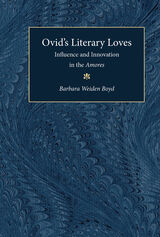
Boyd's thoughtful approach to imitation in Latin poetry brings into prominence the formative role played by Virgil in shaping Ovid's "poetic memory," even in the Amores. The detailed examination of Ovidian extended similes shows how the poet exploits the literary past precisely in order to free himself from generic restraint and to expand the narrow horizons of elegy. Boyd argues that this paradox is the essence of Ovidian poetics.
Ovid's Literary Loves is an imaginative approach to imitation in Latin poetry and makes a significant contribution to current discussions of the subject. This is one of the first contemporary scholarly monographs on the Amores, and it will find a large and welcoming audience of Latinists at all levels of study.
Barbara Weiden Boyd is Associate Professor of Classics, Bowdoin College, Brunswick, Maine.
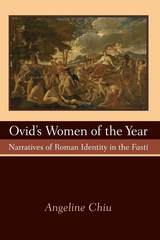
Of interest to literary scholars, antiquarians, and those studying the social and political roles of ancient women, Ovid’s Women of the Year offers an intriguing view of an Ovidian poem now coming into its own.
READERS
Browse our collection.
PUBLISHERS
See BiblioVault's publisher services.
STUDENT SERVICES
Files for college accessibility offices.
UChicago Accessibility Resources
home | accessibility | search | about | contact us
BiblioVault ® 2001 - 2024
The University of Chicago Press









